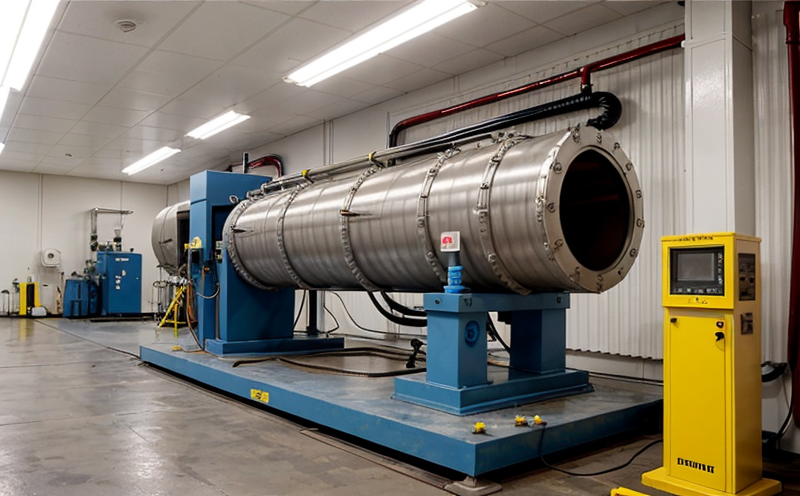ISO 18245 Isotopic Composition Testing of Spent Fuel
The ISO 18245 standard is a crucial guideline in the nuclear fuel and isotope testing sector, ensuring accurate determination of isotopic compositions within spent nuclear fuel. This service is pivotal for various stakeholders, including quality managers, compliance officers, and R&D engineers, as it addresses the intricate chemical composition analysis required for decommissioning processes, safety evaluations, and waste management.
Spent nuclear fuel, a byproduct of nuclear reactors, contains a complex mix of isotopes. Accurate isotopic analysis is essential to ensure that all spent materials are properly categorized and handled according to international regulations. This testing service adheres strictly to the ISO 18245 standard, providing precise measurements of uranium, plutonium, and other relevant elements' isotopic ratios.
The process begins with the careful preparation of the fuel sample, which involves meticulous handling to avoid contamination. Once prepared, the sample undergoes analysis using advanced instrumentation such as inductively coupled plasma mass spectrometry (ICP-MS) or high-resolution gamma spectroscopy. These techniques allow for detailed isotopic fingerprinting, ensuring that all relevant isotopes are quantified accurately.
The results of this testing are critical for several reasons. First, they ensure compliance with international standards and regulations, which is essential for the safe handling and disposal of spent fuel. Second, accurate isotopic data helps in optimizing reprocessing strategies to extract valuable materials while minimizing waste. Third, these tests play a vital role in environmental safety assessments by providing insight into potential long-term radioactive risks.
Understanding the isotopic composition also aids in reactor design improvements and fuel cycle optimization. By knowing exactly which isotopes are present and their relative abundances, researchers can better understand the nuclear reactions that occur within reactors, leading to more efficient fuel utilization and waste reduction strategies.
The ISO 18245 standard ensures that all laboratories performing this test adhere to a rigorous set of procedures. This includes specific sample preparation methods, calibration protocols for instrumentation, and quality control measures. By following these guidelines, the testing service can produce reliable and reproducible results, which are essential for trust in nuclear fuel management.
In summary, ISO 18245 isotopic composition testing of spent fuel is a cornerstone of modern nuclear decommissioning practices. Its precise measurements ensure regulatory compliance, facilitate safe handling and disposal, optimize fuel reprocessing strategies, and contribute to environmental safety assessments. This service is indispensable for stakeholders in the nuclear sector who must navigate the complex landscape of spent fuel management.
Why It Matters
The importance of ISO 18245 isotopic composition testing cannot be overstated, especially given the critical role it plays in nuclear fuel and isotope management. Accurate determination of isotopes within spent fuel is essential for several key reasons:
- Regulatory Compliance: Adhering to international standards ensures that all processes are conducted safely and legally.
- Environmental Safety: Properly managed isotopic data helps in assessing long-term radioactive risks, contributing to environmental safety.
- Fuel Optimization: Understanding the isotopic composition aids in optimizing reprocessing strategies for maximum efficiency.
- Research and Development: Precise measurements support ongoing research into reactor design improvements and fuel cycle optimization.
In essence, this testing service is not just a technical exercise; it is a vital component of nuclear safety and sustainability. By providing accurate isotopic data, the service ensures that all stakeholders can make informed decisions about spent fuel management.
Industry Applications
- Nuclear Decommissioning: Accurate isotopic composition testing is essential for safe and compliant decommissioning processes.
- Fuel Reprocessing: Ensuring the precise measurement of isotopes allows for efficient reprocessing strategies.
- Waste Management: Reliable data helps in managing radioactive waste safely and effectively.
- Research and Development: This service supports ongoing efforts to improve reactor design and fuel cycle optimization.
Why Choose This Test
Choosing the ISO 18245 isotopic composition testing of spent fuel is a strategic decision that offers numerous advantages for stakeholders in the nuclear sector:
- International Recognition: Adherence to ISO standards ensures that your results are internationally recognized and accepted.
- Regulatory Compliance: This testing service helps ensure full compliance with international regulations, reducing legal risks.
- Enhanced Safety: Accurate isotopic data contributes directly to environmental safety assessments by identifying potential radioactive risks.
- Optimized Processes: Precise measurements enable more efficient fuel reprocessing strategies and waste management practices.
- Scientific Insight: By providing detailed isotopic information, this service supports ongoing research into nuclear processes and reactor design improvements.
Moreover, choosing this test ensures that your laboratory or facility is up-to-date with the latest advancements in nuclear fuel testing. The expertise and technology behind ISO 18245 ensure reliability and precision, which are paramount for stakeholders in this high-stakes industry.





